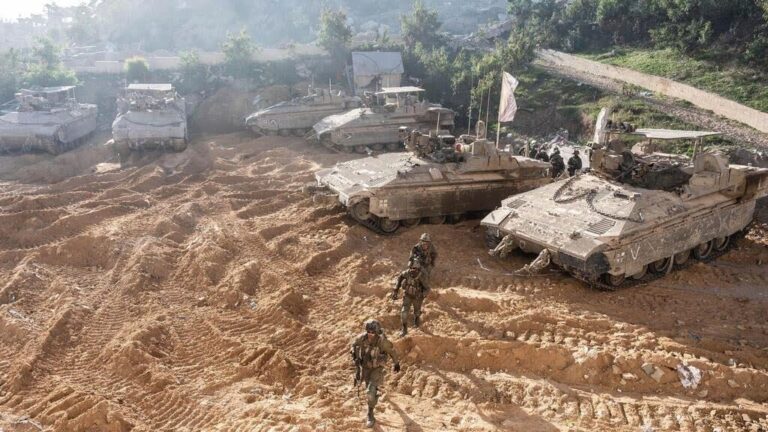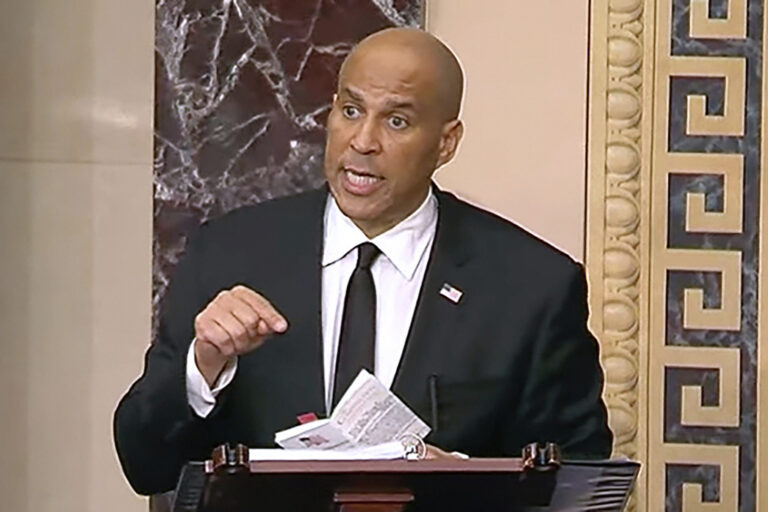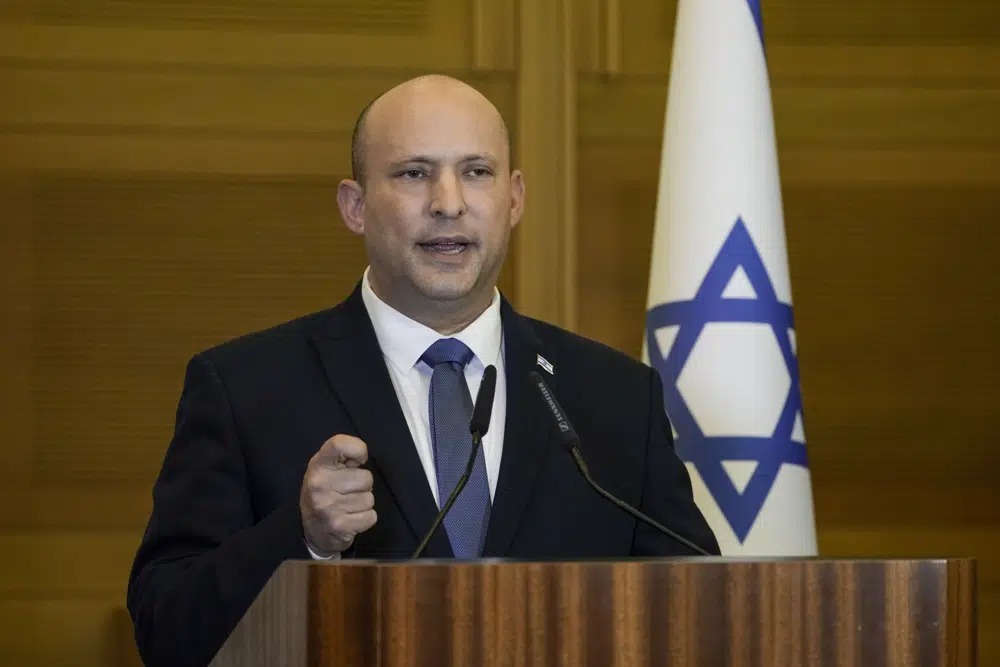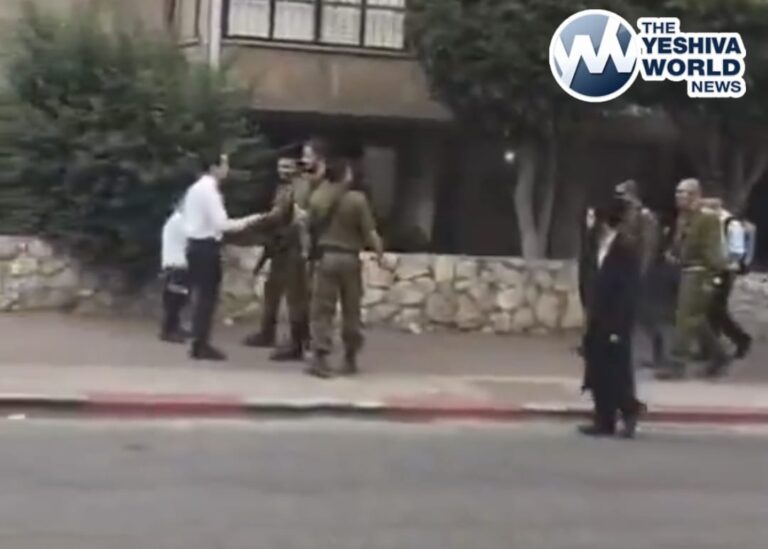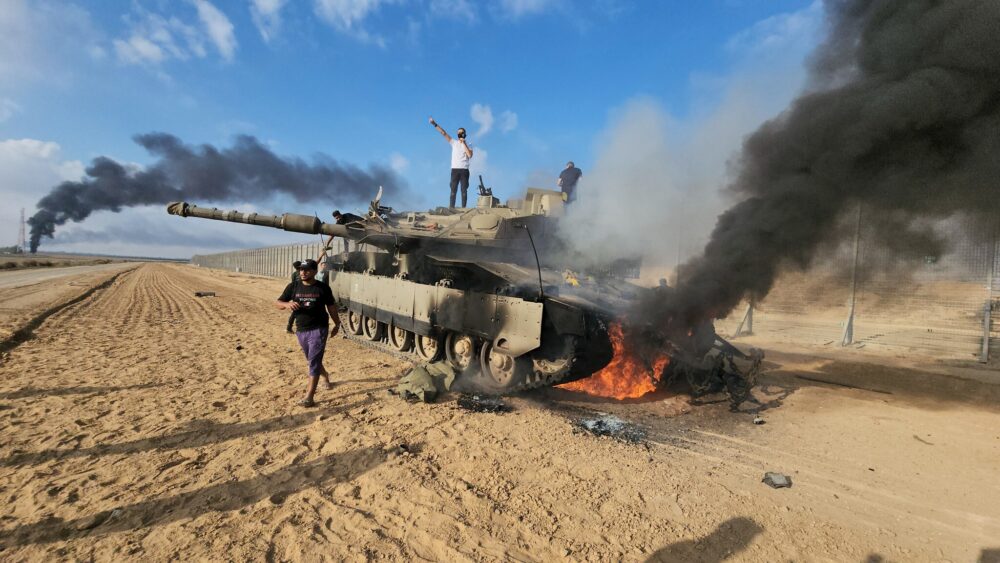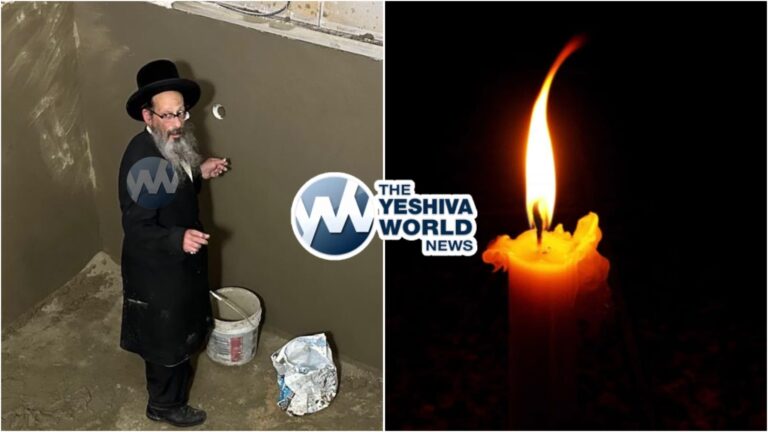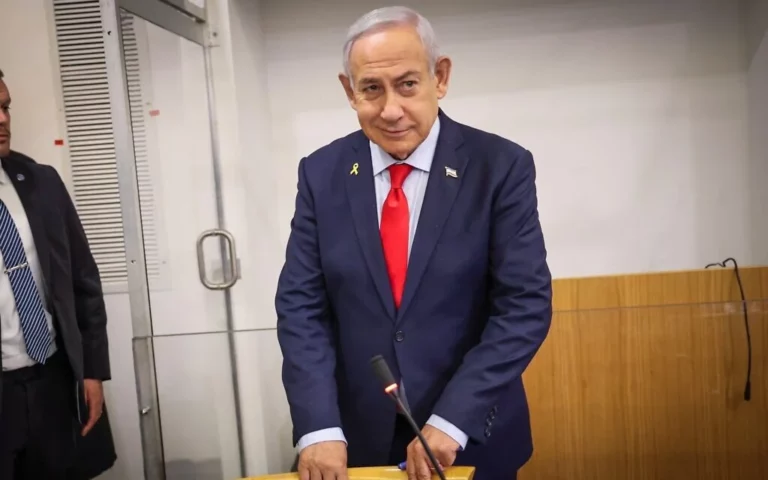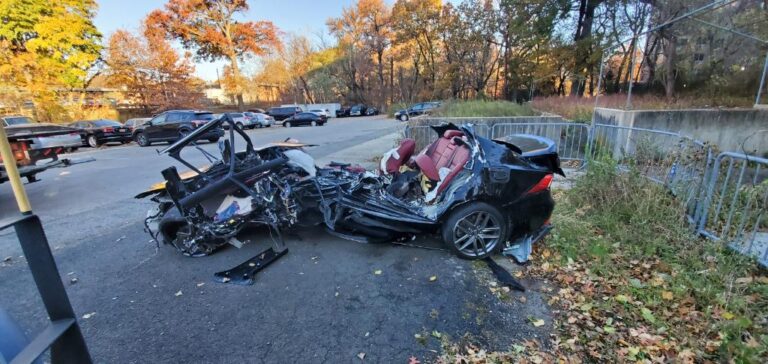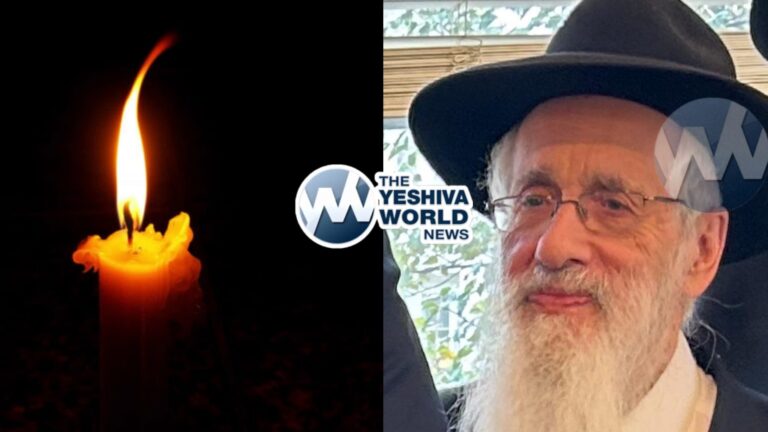 [VIDEOS IN EXTENDED ARTICLE] In August 2009, Journalist Charlie Rose of the PBS Network visited Cairo, and interviewed President Hosni Mubarak.
[VIDEOS IN EXTENDED ARTICLE] In August 2009, Journalist Charlie Rose of the PBS Network visited Cairo, and interviewed President Hosni Mubarak.
Given the current situation in Egypt, this video is fascinating. Especially when Mubarak is told things like: “But they’re writing books now called Egypt After Mubarak, books….”
Charlie Rose: Do you believe President Obama has a different attitude and idea, publicly, about democracy and reform than President Bush? Has he said so to you?
Hosni Mubarak: I can’t say exactly that. But I think that President Obama understands well what was done by the previous administration. Democracy is there in Egypt. We have freedoms that were not there before. We have an election of the president. We have freedom of the press. We have about 600 dailies and weeklies, give or take. We have improved and strengthened the power of the parliament to even do away with a government. We are doing reforms based on the demands of the people. And I think President Obama must understand this very well.
The interview took place just before Mubarak visited the White House to meet with President Obama – not long after Obama spoke in the University of Cairo.
Following the videos, is the full transcript of the interview.
REGARDING THE BUSH ADMINISTRATION’S PROMPOTION OF DEMOCRACY IN THE REGION:
FULL VIDEO
[beginning of transcript]
Charlie Rose: We are in Heliopolis, Cairo in Egypt for a conversation with the president of Egypt, Hosni Mubarak. He is on the eve of a visit to Washington to meet with President Obama and Vice President Biden to talk about the Middle East and other issues. It is his first trip to Washington since 2004. I am pleased to have him back on this program for a conversation about the region, about the issues he sees, about his rule here in Egypt for 28 years, six terms as president. Mr. President, thank you. And all of the talk is about you. They say, is he healthy? Does he feel good? They say he’s experienced tragedy. They say is he going to run again? Will this be the last term for president Mubarak? You say?
Hosni Mubarak: My main effort is to complete the program, it’s for the people. And I made a program, you know, in the campaign. And all the items of the program is going very well. This is my main concern, not to renew or not to renew. I am not thinking about this now.
Charlie Rose: When will you decide?
Hosni Mubarak: I would like to ask you a question. When can you decide the president of the United States now?
Charlie Rose: You can’t.
Hosni Mubarak: You can’t?
Charlie Rose: No.
Hosni Mubarak: Well, yeah, we have the same.
Charlie Rose: But they’re writing books now called Egypt After Mubarak, books.
Hosni Mubarak: In the United States?
Charlie Rose: Yes.
Hosni Mubarak: American. Look, we are a large country. And we have stability here. We enjoy stability. We have a permanent constitution. It has been amended for a number of times. And if you recall, that once you asked me, in one of your interviews, is that the president being elected only by the parliament means some sort of incomplete democracy. At the same moment, that moment, I was ready to propose amendments to the constitution. And we amended 34 articles. That was unprecedented. This is in the interest of stability, in the interest of ensuring people about future. It is not a small country in which we take decisions just like that. It is a stable country, and it will remain a stable one after Mubarak and after the man who comes after Mubarak.
Charlie Rose: You would like for your son Gamal, to come after you.
Hosni Mubarak: Look, this was never raised between my son and myself. He started his career in banking with Bank of America, then in London, then he’ll return to Egypt. And he was against joining the party and it was only after a long effort that he joined the party. It is not on my mind to have my son inherit me. That I, and as well, the choice and election of the president is open to the population in its entirety. It is the decision of the population to elect who would represent people. It is not for me to decide that. It is the decision of the people to elect the person who they trust. Who would that person be? Well, we have a long time. It’s — we have still two years to come.
Charlie Rose: Do you think he is ready to be president?
Hosni Mubarak: I will ask him. Or you can ask him. Don’t ask me.
Charlie Rose: You will not dissolve parliament. You will not dissolve parliament anytime soon.
Hosni Mubarak: There are many rumors.
Charlie Rose: Yes. That’s why I ask.
Hosni Mubarak: There is freedom of speech. People say that the parliament might be dissolved, this or that might be appointed. The government might be sacked. I dont care about these too much … I never dissolved the parliament except once a decision by the High Supreme Constitutional Court. The more good opposition the more stronger our (inaudible). Somebody may say before Ramadan somebody may say after Ramadan. I hear these rumors. Like any other person. I can’t say that I will not dissolve the parliament. There might be some circumstances. I don’t have any at the moment, but there might be some circumstances that call for the dissolution of the parliament, but at the moment, there is no single point that merits the dissolution of the parliament. The dissolution of the parliament becomes imperative only when there is a pressing demand.
Charlie Rose: Mr. President, this weekend you go to Washington. You will be there Monday and Tuesday. You will meet with the president and the vice president. Characterize where the relationship is with the United States today under President Obama.
Hosni Mubarak: President Obama, after the elections, and after winning the elections, contacted me on phone. And that took place twice. And when he went to the White House, he contacted me. And when he came to deliver his speech from Cairo here, it was an excellent speech that ensured — assured the Arab and Muslim countries and people. And it was a clear and loud message to all Arab and Muslim countries. Before that, there was some sort of ideas and concern with the previous administration. But I also met him in Rome during the G-15 meeting. It was not a long time to talk. But when he visited Cairo, we covered all the issues on how to handle the same. And I did find him understanding, and a man who wants to listen and to make his own decisions. And he’s open to all appeals. I advised to listen to everybody. And after that, we will make a full picture from which you can make informed decisions. And I’m very optimistic on steps to be taken by President Obama. He is well balanced in all his speeches and addresses, particularly within the context of accelerating violence, particularly in Iraq, and the concerns in the Arab [unintelligible] countries. Once again, I think that the Obama Cairo speech was an excellent piece of work.
Charlie Rose: It created new opportunities?
Hosni Mubarak: If you mean a new opportunity of peace? Yes.
Charlie Rose: What did it accomplish, the speech?
Hosni Mubarak: You know, of course, the speech, and you listened there, too. It assured the Muslim world because before that, the feeling was that there was a great and extreme bias against the Muslim people by the previous administration. And that created great concern among the Muslims, particularly the leaders across the country. But with the Obama speech, it became clear that he is not against Islam at all. America is not against Islam. This is quite important, so much so that [unintelligible], the director [spelled phonetically] of the [unintelligible] University, Salman [spelled phonetically] Rushdie, wanted to confer the honorarian [spelled phonetically] doctorate to President Obama but the time was so short that he couldn’t do that in time.
Charlie Rose: There is always time. Do you sense that he is about to launch his initiative for the Middle East, President Obama?
Hosni Mubarak: President Obama is collecting information. And he sent George Mitchell a number of times. And he conferred with us. And during each time, we explained our position. And each time he comes to Cairo, I see him. He visited Syria, he visited Saudi Arabia and other countries. And this is an endeavor to grasp the issues facing the region, which is a good thing. It’s much better than taking a decision without listening to the country’s concern. It might damage these countries. It might, as well, damage the reputation of and the image of the United States. And this is what happened. Take, for instance, the decision to go to Iraq. And that, despite the fact that there was no mass destruction weapons. And going to Afghanistan as well. Russia stayed eight years in Afghanistan. However, Russia did not achieve anything. And the Russians admitted to that fact. And there was a general from the Russian physician [spelled phonetically] who came to me. And he said that they stayed with all kinds of weapons for eight years in Afghanistan without achieving a thing. So — and wait till we see what the Americans would see. And I oft repeated that. But the US administration was adamant on something decided a priori.
Charlie Rose: Do you think — do you think the United States should get out of Afghanistan, and avoid —
Hosni Mubarak: Let us talk with President Obama first. It’s much better than delving into it. But I can tell you the following: In Iraq, there is a grain of stability. But that will take time. The situation in Iraq is not an easy one. And I told everybody this. When Mr. Bush said that I will embark [spelled phonetically] democracy into Iraq, I said I wish you could do. Every population has its own nature, culture, customs and history. You cannot come and make some — a carbon copy of each population as that of the American people. Even the country, even the peoples in this region do differ.
Charlie Rose: You were never comfortable with the Bush administration.
Hosni Mubarak: That’s why I did not visit the United States since the year 2004. I didn’t visit the United States since ’04. There are certain rumors that I am not visiting America, or I was not visiting America because of issues related to political reform.
Charlie Rose: Do you think the Bush administration was right to promote democracy in the region in the way that it did?
Hosni Mubarak: No. Look. We do not accept pressures in politics or in interior domestic politics from any administration with due respect to all governments. We do not accept pressures on the pretext of domestic reform. It has to be home-grown. Reform has to be home-grown. And it is what the people demand. This is one issue. But to accept pressure from an administration or another, no. This pressure might be against the interest of the people. I respond to the demands of the people.
Charlie Rose: Do you believe President Obama has a different attitude and idea, publicly, about democracy and reform than President Bush? Has he said so to you?
Hosni Mubarak: I can’t say exactly that. But I think that President Obama understands well what was done by the previous administration. Democracy is there in Egypt. We have freedoms that were not there before. We have an election of the president. We have freedom of the press. We have about 600 dailies and weeklies, give or take. We have improved and strengthened the power of the parliament to even do away with a government. We are doing reforms based on the demands of the people. And I think President Obama must understand this very well.
Charlie Rose: It is said that he will not publicly discuss human rights. He does not want it to be an issue, but that he will bring it up in private.
Hosni Mubarak: Look, please. Your concept of human rights is a merely political one. Human rights are not only political. You have social rights. You have the right to education. You have the right to health. You have the right to a job. There are many other rights. And we are doing well on these fronts. But we are not absolutely perfect. Nobody is perfect. We have a human rights commission. We have supervision of that. And he or she that would not abide by law is brought to the book before a court of law. We have a strong supervision, being in the — on the administrative front and administrative supervision or a police supervision. And there have been many sentences against people who have breached human rights. It is not merely a political concept. It is social. It is health. And it is — America made it as one.
Charlie Rose: But as you —
Hosni Mubarak: We observed them.
Charlie Rose: Much is written about the fact that in the election, the most — the last election in which there was more candidates, that since then, you have moved away and that you have cracked down on the Muslim Brotherhood.
Hosni Mubarak: Let somebody read the Egyptian constitution to you and the amendments we have introduced therein. These people whom you are talking about cannot form a political party, because our constitution maintains and stipulates that a political party shall never be based on a religious basis. They cannot form a political party. And this is part and parcel of the constitution as amended by the people. But the Muslim Brotherhood are there as MBs, as individual MBs within the parliament. We have about 80 of them.
Charlie Rose: Do you fear the Muslim Brotherhood? Do you worry that they are close to Hamas, they’re close to other Islamic extremists?
Hosni Mubarak: I know — I know that they have some contacts with them. They have contacts with Hamas. They have contacts with Hezbollah. These are well-known. And they have contacts with many organizations. They have contacts with people of the international Muslim brotherhood based in Geneva and elsewhere. But we can contain this and proper resolve [spelled phonetically].
Charlie Rose: You’re not worried.
Hosni Mubarak: We do not fear such things.
Charlie Rose: The main subject between you and President Obama will be peace in the Middle East, Israel and Palestine. Tell me where that is. Tell me what Egypt’s role is. Your own General Suleiman [spelled phonetically] has met with Hamas, he’s met with Fatah [spelled phonetically], he’s met with Israel, are you making progress?
Hosni Mubarak: I just wonder why you are not aware of the role Egypt is playing in this process. You are asking about the role of Egypt in this process. I think you are very much following this and you are a noted media man. We have a major role in this issue. We share boundaries with the Palestinians. We share boundaries with Gaza, Jordan shares boundaries with the West Bank. The stability of this part of the world means the stability of the Arab region. But failing to solve this issue when jeopardize the stability of even the globe itself, we are trying to solve the problem between Hamas and the authorities in the West Bank because this is quite an important, we should fill the gap here and we should bridge the gap because, unless we reconcile their differences, there will not be stability there, there will not be stability even in Israel. Violence will recur. We are doing our best to bring about stability without which and without solving this issue, the facts on the ground will be very, very challenging.
Charlie Rose: Are you making any progress?
Hosni Mubarak: Sure we have made progress. But it will keep going [spelled phonetically]. You know, for instance, dealing with Hamas and the Palestinian authority does take time. And what retards the process is some sort of external intervention. For instance, we were just about to facilitate the release of the prisoner Shalid [spelled phonetically]. You know that he’s our prisoner.
Charlie Rose: Right, held by Hamas in Gaza.
Hosni Mubarak: We were just about to secure his release in our custody and solve this problem but external interventions, outside interventions hindered that but we are working on that and in collaboration and cooperation with the Germans.
Charlie Rose: It is said that the Israelis, you have said this or suggested this, the Israelis made extra demand and prevented you and Egypt from gaining control of the prisoner so that you could return him in exchange for Palestinians, that the problem was that you had a deal and Israel made additional demands, is that true?
Hosni Mubarak: You have a good deal of truth in what you said. We had agreed on the release of a number of the prisoners but at one point in time Israel added certain terms and conditions that impeded progress, that is, in addition to external interventions so we are doing an effort and the Germans are willing to join hands and we do welcome them in order to secure that. The deal or the agreement was to take care of Shalid and that Israel would release a number of prisoners, and when this is done we will hand over Shalid to the Israelis. We are still following this. Our intelligence organization is working on that, and we still have hope to conclude this on a good note.
Charlie Rose: Do you think it’s likely to happen soon?
Hosni Mubarak: I can’t say that certainly because dealing with others may take time. For instance, when we are doing our best to do some reconciliation between the Palestinians and Fatah, at the 11th hour you’ll find a new difference, you’ll find new terms and conditions, and we received Hamas delegations, we received the Palestinian authorities. The process is on, and we still have a great hope that we will conclude this successfully.
Charlie Rose: It is also said that you wanted to bring together Hamas and others and that Syria prevented you from having a conference.
Hosni Mubarak: I don’t want to mention any country in particular by name, but I know that there are certain interventions by other countries. I cannot say that Syria is the one that impeded things. You know that. I know — you know, and I know that. It is clear. The contacts with Iran are clear, and there are constant contacts between them, Hezbollah in Lebanon, Hamas in Gaza, and you might have heard about the demonstrations that were staged in Tehran a couple of days back — ago.
Charlie Rose: Yes.
Hosni Mubarak: They say, “No Gaza; no Lebanon.” “We are” — “We wish we can spill our blood for the sake of Tehran.” Could you get it? “No Gaza. No Gaza.” And, “No Lebanon,” meaning — referring to Hezbollah, but we could sacrifice the Iranian — sacrifice — would sacrifice their lives for the sake of Tehran. But they don’t care about Gaza; they don’t care about Lebanon. This would give you the bottom line of what’s going on.
Charlie Rose: Do you believe Iran plays a destabilizing role?
Hosni Mubarak: I’d like to tell you something about Iran. Iran and the internal problems that they have in their country, they say there’s some interference from other countries of world, from foreign countries, not from Iran, that pushed the Iranians to hold these demonstrations and the strikes and all these things. I support them: if there’s something — if there’s some part interfering in Iran, we assert [spelled phonetically] them. And at the meantime, however, until Iran — I say to Iran, “If you complain of interventions from external forces in Iran, I would say to you, ‘Don’t interfere with the home affairs of other Arab countries like Lebanon, like Hamas and others.’ Since you complain of this external or foreign interference, so don’t do it with other countries.”
Charlie Rose: And so what do they say? When you say to the Iranians, “Don’t be supporting Hezbollah in Lebanon; don’t support Hamas in Gaza, because you’re interfering in other countries with your money and with your arms and whatever else they give,” what do they say?
Hosni Mubarak: I haven’t met any of them to say this to them. However, we see from the moves that he has, they want to give some aid [spelled phonetically] to go through Rafa to Gaza.
Charlie Rose: Right.
Hosni Mubarak: I would say, “No.” We object to this. We object to this. We would like to get this aid in through the Israeli’s outlet, this other one. So they wanted to have it through the outlets which we have, the closest point we have, because this was as such based on agreement between the Palestinian Authority and the European Union that a representative should be there, but Hamas kicked away this European representative. Then, they should be closed — this outlet should be closed. We open it only for humanitarian assistance: someone would like to come here for treatment or to have an abode for those going to Hajj or Umrah, for the very basic needs of medicines and theocratic materials under our own responsibility. We give these materials in. Israel knows this because they should know what the items we let pass. But no other materials or substances should go through at the checkpoint. But to go to the other one, that we have some cargo. Suppose there are some weapons. So we do not.
Charlie Rose: Right.
Hosni Mubarak: But [unintelligible] having weapons inside is [unintelligible].
Charlie Rose: This has led some, Hamas, Hezbollah, Arab street, to suggest that you are too close to Israel’s views, that you favor Israel in some cases.
Hosni Mubarak: I only work for the sake of peace, to solve the problems, and because our common interests are to solve these problems. So, but our relationship to Israel is for the public good, for the stability, and not in favor of one country against another.
Charlie Rose: Back to Iran. There is this idea in this region, the Middle East and the Gulf, that Egypt and Iran are competing to be the dominant regional force. Egypt, Iran.
Hosni Mubarak: First, we do not compare ourselves to Iran. Iran is not an Arab country, to start with.
Charlie Rose: It’s in the region.
Hosni Mubarak: We — so it’s in the region, the Gulf areas and Arab countries, this means they are trying — they are attempting. But we’re no — our effort is known. They are trying to dominate certain areas, but they will not succeed in this. We are capable — we are not competing with them. And our role is well-known in the region. However, we’ll not compete about the region. It seems to be that people are thinking of some might — wishful thinking saying this.
Charlie Rose: Do you think Israel will allow Iran to have a nuclear weapon?
Hosni Mubarak: Look, I met the prime minister of Israel. And before Netanyahu and Olmert before and the minister of defense in Israel. And the president Shimon Peres. All of them are against nuclear weapons in Iran. But our understanding is that the whole region should be free of all forms, all types of mass effective weapons. And nuclear or not nuclear, whether Iran or Israel. So this doesn’t mean, since that Israel has, Iran would come up with something and others also. This would be a problem.
Charlie Rose: It is also said that you are urging President Obama to urge Israel not to use — not to engage in a strike against Iran.
Hosni Mubarak: Look, I would like to say something. This issue of the nuclear capability of Iran, if it goes on like this, and it happened that a military force is used, this will be against the whole region. I am against use of military power. That’s why I say this should be solved amicably, peacefully. And I commend Iran. I call on Iran that you have this sufficient flexibility to negotiate with representatives of the United States of America to resolve this issue, in order that no military actions would be brought about. We want to stop all military activity.
Charlie Rose: There is some debate in America as to whether the Obama administration is correct in re-engaging, re-engaging with Iran. Should they?
Hosni Mubarak: I think that negotiations between Iran and U.S.A. is much better a solution if they can achieve some conclusions without using the military force.
Charlie Rose: Let me come back to Arab-Palestinian and Israeli-Palestinian. The Arab initiative is considered to be a bargaining position.
Hosni Mubarak: The Arab initiative is very clear. If Israel solves the problem between them and the Palestinian, and two states are established, Israel with Palestine, two states, I think Arabs we can have normal relations with Israel.
Charlie Rose: Settlements have to stop.
Hosni Mubarak: I have another point of view. And instead of saying stopping more settlements, and we heard this many times, now for over ten years. And never come to a stop. What I can say is that we have to consider the whole issue holistically, to negotiate on the final resolution. They wanted to have some temporary or final solutions. I said, forget about temporary, because the people will think that this is the final step. My point of view is that to see the final solution, the same happened with us, the same with it. So we have an agreement for final resolution and they left the Sinai on [unintelligible]. If we can do this with the Palestinians, I think this would be a very good sign [spelled phonetically].
Charlie Rose: And what’s necessary to do it? What has to happen to make the agreement to create a Palestinian state that Israel feels secure so that there will not be Hamas or someone else on the West Bank able to lob missiles into the Israeli International Airport?
Hosni Mubarak: Look, [unintelligible] how to come to this agreement, we are working on this resolution between Hamas and the Palestinian authority. If we can come to a conclusion, especially if the external interference were to start, we can convince the Palestinian authority to sit for negotiation with Israel every [spelled phonetically] year, Prime Minister without preconditions on both sides of the parties and then all of us would assist on this [spelled phonetically]. This is the optimal solution.
Charlie Rose: What progress have you made in leading the way to get five billion dollars reconstruction going to Gaza?
Hosni Mubarak: No one has received any money so far. We had a conference and we agreed on five billion dollars but until now who is going to receive this amount of money so one entity should take it and to spend them so we need a committee that to — agree on a committee to reconstruct together using these funds. It’s not to be given to Hamas or to be given to the authority as well.
Charlie Rose: Do you believe that until Hamas and Fatah can agree, there can be no peace?
Hosni Mubarak: This is correct. And we are working on this and we exert laborious efforts in order to have some convergence, and there’s still some minor points we try to overcome between Hamas and Fatah. And if we reach this point, I think after that the process will go much easier.
Charlie Rose: Benjamin Netanyahu, the Prime Minister of Israel, talked with you this week, this week, Monday, Tuesday, Monday I think so, Monday.
Hosni Mubarak: Oh, you see, you know everything. And Shimon Peres.
Charlie Rose: What was the —
Hosni Mubarak: Shimon Peres is for me last Wednesday. And Barak just left now.
Charlie Rose: So what’s the conversation about? What are you talking about?
Hosni Mubarak: So we are talking about how to sit together and negotiate on solving these problems, final borderlines or temporary ones and there is some sort of agreement between [unintelligible] and Netanyahu on the — Barak also agreed on it. That’s how we come to the final solution and the implementation on stages. It should be of course a very tough negotiation but this is better.
Charlie Rose: I have asked you this before. I have asked you this question before. Do you believe Benjamin Netanyahu, the Prime Minister of Israel, is prepared to see a state of Palestine? Is he ready?
Hosni Mubarak: Look, I hear [spelled phonetically] something you asked me, I [unintelligible] question to understand, I led [spelled phonetically] in the Israeli press they say that the father of Netanyahu said I will not allow a state, I think you should have read this, a Palestinian state, but this might be something that is [unintelligible] without establishment of Palestinian state, no stability will be achieved and will be continue with this ruckus and this violence and the region will never be calm. I think now it is the right time that we should achieve a resolution. Netanyahu, when he formed his government and had the approval from the Knesset, phoned me, and he had next to him the Minister of Trade. He told me —
Charlie Rose: Is he prepared to take a risk for peace? And what risk are you prepared to take?
Hosni Mubarak: We?
Charlie Rose: Yes. What are you prepared to give to create, contribute to peace between the Palestinians and the Israelis.
Hosni Mubarak: We are working on this. We are very keen that there should be stability, and no stability will be unless we have the Palestinians resolve their inner problems and the thoughtful negotiation [spelled phonetically] with the Israelis, and we’ll assist also as regarding the meeting between the Authority — Palestinian Authority — with the Israeli government. Or, do you mean something else?
Charlie Rose: No, I didn’t. I meant exactly that. There are some who suggest there ought to be a Syrian track, a Syrian track. “Go to Damascus. That’s where you start because they have influence with Hamas.”
Hosni Mubarak: I don’t want to talk about Syria, despite the fact there are some problems with them, but it is an Arab state and a friendly state. But they cannot stop — they can impede, maybe, through interference by Iran, because the head of the political office is in Damascus, but the people, they are looking for peace. Even people in Gaza, they want peace. And if the people wanted to have peace, nothing can stop it. When there was a military attacks on Gaza, many people were killed, and many buildings were destructed were — where so much impact was this because they have the border alliance with us, and people want to live and use their life. And I call the Minister of Defense, I recalled, for stopping this, and we invited the Prime Minister of UK and the President of France, and they were with us in this. And they shuttled with Merkel, and this was stopped. This fight stopped because people want to live in peace.
Charlie Rose: What role is Qatar playing? Qatar, the Emir, where Al-Jazeera comes from?
Hosni Mubarak: So don’t get me into trouble.
Charlie Rose: I won’t. [laughter] Tell me what you think. Qatar.
Hosni Mubarak: Qatar can play a good role.
Charlie Rose: Are they playing a good role?
Hosni Mubarak: If they want. If they want.
Charlie Rose: But they’re not now?
Hosni Mubarak: I cannot say for sure, because there is nothing clear before me to decide.
Charlie Rose: They want to play a role.
Hosni Mubarak: Okay. Let’s — they play a role. If they can play a good role for the sake of peace, we’ll clap hands for them. We want peace. You did. I did. Anyone, which is not the point, but peace that matters.
Charlie Rose: When your friend, President Obama, came to Cairo and made the famous speech, he talked about Israeli/Palestinian, he talked about democracy, he talked about women, he talked about economic development, and he talked about extremism. Where is the battle today between the forces of extremism and the forces of moderation?
Hosni Mubarak: I think this question you could have asked it to the previous administration. The previous administration, with the politics that they have, which is combating terrorism, terrorism was multiplied tens of times. And the terrorist force is increased. So what happened in Iraq, Iraq was sort of distracted. Afghanistan. It was difficult to control Afghanistan, and saying to frankly is very mountainous area and tunnels area, and whatever you do, you cannot get into anything. Afghanistan has a specific way — they should have a specific way to deal with them. We used to deal with them before this war. They have certain style, how to handle them. You see the clans and the tribes. You see the heads of tribes. And try to talk to these people, do some development for them. You can save the money you spent through attacks. The Russians have said that. They were eight years bombing Afghanistan. And they have no success. I think the optimal solution is to have development in Afghanistan and discussing matters with the heads of tribes and clans. This might save you a lot of the bloodshed that happens over there.
Charlie Rose: Is the role of women in the Middle East going to change? Is it changing in Egypt? The role of women.
Hosni Mubarak: Don’t you know that the role of women has changed? We amended the constitution for the sake of women. That’s one of the main points of our amendment for women in the parliament. We have, I think, the exact number of parliament women. We have women, presidents of universities in Alexandria, first time in Alexandria the first [spelled phonetically]. The president of the university is a woman. We have female ministers and professors and deans of different faculties and colleges. Now women is working in the political field. We have large number of them in our [unintelligible]. So the role of women has changed radically, especially in our country, in Egypt. And the constitution gives the right for women to certain candidates will be capable of running for the election to Parliament.
Charlie Rose: Let me make this — a number of points I want to make here. One, you’ve had emergency rule since 1981. Emergency rule. You should be confident enough in your leadership not to have to —
Hosni Mubarak: You do not grasp fully the emergency law. It has been there since the days of the British occupation. And it used to be called marshal law. We confine our recourse to the emergency law, to terrorist crimes. Otherwise it is the rule of law under the normal laws through the parquee [spelled phonetically] and the courts of law. But do not believe what you say. We have demonstrations held there. But if you go to the letter of the emergency law, nobody would hold that demonstration. And this emergency law was agreed upon by the majority.
Charlie Rose: But is it necessary?
Hosni Mubarak: — of the people, represented in the parliament. Might be the Muslim Brotherhood that are against that. Let me complete. We have two choices, either to issue a law to combat terrorism, which will be a permanent law. It was refused because nobody wanted a permanent law. And the second choice is emergency law that will be used exclusively against terrorist crimes. We have not used it for an intent to close down a newspaper or to contain or limit any movement, any freedom of movement. Any other argument is baseless.
Charlie Rose: Do you believe the Muslim brotherhood is good for Egypt?
Hosni Mubarak: As long as they do not commit any terrorist crimes, I don’t care.
Charlie Rose: You don’t care.
Hosni Mubarak: Right. Yeah, read history, please. Read history, please. History is there to read.
Charlie Rose: The history of Egypt for the last 28 years is the history of one man, Hosni Mubarak, that’s the history of Egypt. What is your legacy? What are you proud of? What will they say about you when you leave?
Hosni Mubarak: What I will leave behind is that I have been working for — in public service for 60 years. I took part — I saw action. I rebuilt the country after military action. We revamped the entire infrastructure of Egypt. We are improving education. We are expanding education. We are building universities. We are doing many, many other things.
Charlie Rose: Would Egypt be safe if you left?
Hosni Mubarak: Egypt is a large country. Egypt has a constitution. And the constitution sets clear the role of each and everybody, and nobody can violate the constitution. But if Egypt were a one-man, as you say, or as it is said, I wouldn’t have done anything. I work with the help of institutions, with the help of parliament, the parliament is quite strong now. It can sack [spelled phonetically] a government. It can bring down a government, losing the vote of confidence. It can change the budget the way they decide, the way the parliament decides. We have amended 34 [unintelligible] articles in the constitution. This is unprecedented.
Charlie Rose: Mr. President, with respect, many people say that there will not be a leader of Egypt who is not acceptable to the army, as you have been, as Anwar Sadat was, as Nasser was, all of the same tradition, the free officers tradition, that has not changed in Egypt. You know that. I know that.
Hosni Mubarak: It could, might change afterwards. This might change afterwards. Nobody knows who will succeed. We have elections. When the time comes for election, the people will vote. Nasser was an army officer. Sadat was an army officer. I stayed in the army and the armed forces till I reached the highest rank, and I saw action in October, and I was decorated at the highest level. It is not a minus point to become president. I served as vice president doing lots of efforts for six years as vice president. Then I took over as president.
Charlie Rose: Yes, but that’s my point is that there is no one going to become president of Egypt who’s not acceptable to the military.
Hosni Mubarak: No, no, no. I don’t agree to this statement.
Charlie Rose: Many people now write — the Economist magazine — that there is a new future for the Arab world. Egypt is the leader of the Arab world along with Saudi Arabia and other countries. Tell me how you see that: the future for the Arab world because some say, you know, that Egypt and others are more modern, more engaged, more entrepreneurial, and more free. That’s the future. There is an awakening, an awakening.
Hosni Mubarak: This is right. This is a valued statement. Yes, there is a very big awakening in the Arab region, and there are new generations, and there are — there is new blood in the public service, and there is quite a change undergoing in the Arab world.
Charlie Rose: From the Presidential Palace in Heliopolis, Cairo, the President of Egypt, Hosni Mubarak. Thank you for joining us. We will see you tomorrow night, as the President engages tomorrow morning with the President of the United States. See you tomorrow night. Thank you.
[end of transcript]
(YWN World Headquarters – NYC)

